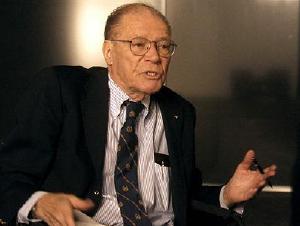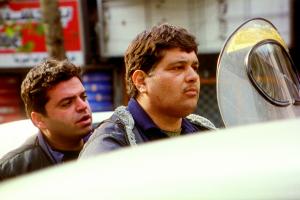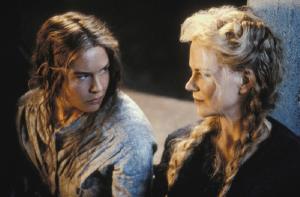|
Issue Date: January 30, 2004 War and Oppression Movies explore blindness of war-makers, class division in Iran By JOSEPH CUNNEEN
The Fog of War will probably stand up as the timeliest movie of the year. Errol Morris’ documentary, an extended interview with Robert S. McNamara, defense secretary under Presidents Kennedy and Johnson, shows the blindness that dominated U.S. policy in Vietnam, and inevitably raises questions about a similar fog guiding Bush and Co. in Iraq. Morris’ work is successful because it allows its subject to offer his own explanations. This is no hatchet job, and McNamara comes through as more sympathetic than I expected. Of course, he would not have consented to a more aggressive interview; alert observers will surely think of follow-up questions that are not asked. The film is framed in terms of 11 lessons about war and human error that McNamara has drawn from his experience. Lesson no. 1 is “Empathize with the enemy.” Apparently McNamara and those around him were so blinded by fear of communism and the “domino theory” (other countries would turn communist if Vietnam was abandoned) that they were unable to realize that the Vietnamese were trying to reclaim their country from generations of colonialism. I recall my chance encounters with Vietnamese students in 1945 Paris while on detached duty from my infantry division at the time when the United States released atomic bombs over Japan. These young Vietnamese knew both Jefferson and Marx better than I did, but I assured them that the United States would support their struggle for independence from France; after all, we believed in the principle of self-determination. Morris avoids the static quality of interview films by skillfully introducing provocative background material, especially on the firebombing of Japanese cities in which 900,000 Japanese civilians were killed. McNamara was working under Gen. Curtis LeMay, who told him, “If we’d lost the war, we’d all have been prosecuted as war criminals.” Conceding that they were behaving as war criminals, McNamara asks, “What makes it immoral if you lose and not immoral if you win?” “The Fog of War” becomes a fascinating character study of a brilliant problem-solver who concedes that mistakes were made because military planners could not see the whole picture, yet remains unapologetic. It makes us reflect on the terrible blindness of our current war-makers and raises questions about the very nature of evil. The 85-year-old McNamara is introspective and self-critical, recognizing how hard it was to oppose a president, and believes Kennedy had a plan to get us out of Vietnam. But he refuses to comment about a president in the midst of a war. He asks, however, “What makes us omniscient? ... If we can’t persuade nations with comparable values of the merits of our case, we better reexamine our reasoning.”
Crimson Gold, the powerful new Iranian film of Jafar Panahi (“The White Balloon”), shows how everyday humiliations and frustrations drive Hussein, an overweight pizza deliveryman, to a shocking act of violence. With Hussein played by Hussein Emadeddin, a real-life pizza deliveryman who is also a paranoid schizophrenic, the movie dramatizes the common urban blight in which two social classes exist, the impoverished and the well-off. Because of its critical presentation of injustices in Iran, the film has not yet been able to be shown there. The screenplay of celebrated director Abbas Kiarostami makes sure we get a realistic tour of a busy, crowded Tehran. The most memorable image in the movie is that of Hussein’s withdrawn look behind the windshield of his motorbike as he weaves his way through the city, making deliveries at a house where soldiers stake out a decadent party and at the luxurious apartment of a lonely playboy. There is bitter humor in the way Hussein gets the soldiers to share the pizzas he is unable to deliver, and again as he examines the modern luxuries enjoyed by the playboy.
Hussein is engaged to the sister of his upbeat young friend Ali (Kamyar Sheissi). He would like to buy her a necklace, but he and Ali are refused entrance to a fancy jewelry store because of their scruffy appearance. They dress up in their best suits and return with the fiancée (Azita Reyeji), but are humiliated by the shop owner -- and by their inability to pay for what they see. The fiancée tries to be supportive, but the already-repressed Hussein maintains a disquieting silence. The entire film is a flashback from a brilliant opening sequence -- a four-minute, camera-steady shot -- that shows a robbery at a jewelry store that descends into bloodshed. Watching “Crimson Gold,” we are moved by images of humanity under oppression as the authorities make an issue of drinking and dancing. It is depressing to realize that when Panahi came to the United States, he was chained to a bench at the JFK Airport while in transit to another country.
Cold Mountain, the adaptation of Charles Frazier’s best-selling novel, has been hailed as an epic, mostly because director Anthony Minghella keeps announcing that it is, coaching his principals to take edifying stances. Not that the courage of the runaway Confederate soldier Inman (Jude Law) in coming hundreds of miles to get back to the beautiful Ada Monroe (Nicole Kidman) isn’t impressive. Ada is a city-bred young woman enduring wartime want in a rural village. Fortunately, capable, forthright Ruby (Renée Zellweger) injects humor into the proceedings when she comes to help Ada manage her father’s neglected farm. The relationship between these women is livelier than the episodic sequences of Inman’s journey home, since Law is mostly asked to strike noble attitudes to the accompaniment of Gabriel Yared’s lavish symphonic orchestration. If Inman’s encounters reveal his determination, they are not always convincing, especially the evening he spends in a cabin with a lonely widow. Ada is sympathetic in rejecting the advances of a Home Guard officer searching for deserters, but the languorous longings of Inman and Ada project a largely unearned emotion. The desperate effort of the lovers to preserve a sense of hope under dire circumstances deserves sympathy, but the routine sex scene after Inman’s return makes a mockery of the film’s pseudo-heroism. Joseph Cunneen is the regular film reviewer for NCR. His e-mail address is SCUNN24219@aol.com. National Catholic Reporter, January 30, 2004 |



